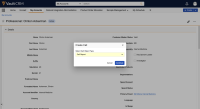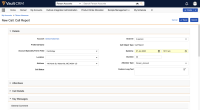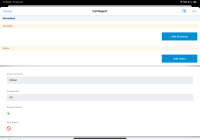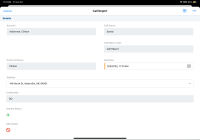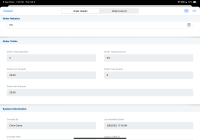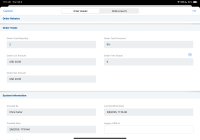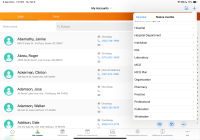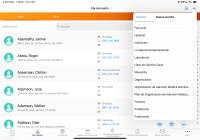What's New in 24R3.4
Our release notes offer brief, high-level descriptions of enhancements and new features.
- Sandbox Release - February 13, 2025
- Production Release - February 20, 2025
New Fields, New Objects, and Removed Fields are also included.
Announcements
Updates to Veeva Messages
The following Veeva Messages are updated with the 24R3.4 release to align with Vault terminology for the "Copy" action. Any previous edits made directly to these Veeva Messages are overwritten. If customers copied the Veeva Messages and then edited the copies, those edits are not affected.
- CallReport-CLONE-en_US
- Common-CLONE-en_US
- Surveys-CLONE_SURVEY-en_US
- Surveys-CLONE_SURVEY_PROGRESS-en_US
- Surveys-CLONE_SURVEY_WITH_TARGETS-en_US
- ACCOUNT_PLAN-INSUFFICIENT_ACCESS_CLONE_ACCOUNT_PLAN-en_US
- ACCOUNT_PLAN-SELECT_RELATED-en_US
- ACCOUNT_PLAN-ACCOUNT_PLAN_HIERARCHY-en_US
Features
Account Management
Dynamic Attributes for Accounts on Browser
Users on the Browser platform can use custom fields defined by business admins to record information about an account for an upcoming business need, for example, a new product launch, campaign or other business initiative.
Account Planning
Administrators can configure automatic sharing of account plans and related data to account team members. This ensures the appropriate users have the correct visibility to their account plans and related information.
Key stakeholders are external stakeholders important to the progression of an account plan. These stakeholders can include HCPs, hospital or health system administrators, committee members, or anyone who influences the relationship with the account on the account plan. Key Account Manager (KAM) users can add key stakeholders to an account plan manually or select key stakeholders from existing affiliations in the Sphere of Influence or Account Hierarchy.
Approved Email
Recommended emails empower business admins to create pre-approved emails for target accounts. Organizations can use recommended emails to share new information, for example recent studies or product updates, with many HCPs at once. Business admins can tailor the message content to the targeted accounts, and Vault CRM creates scheduled emails or drafts for end users to review, modify, or send to the recipients.
Call Objectives
The following features are now available on CRM Desktop (Windows):
Call Planning
Associating Unassigned Presentations with Unique Activities Group Calls
For accurate reporting on CLM activity, users can associate unassigned presentations with new or existing call reports in My Schedule. When associating an unassigned presentation to a new or existing unique activity group call where only some of the attendees on the call viewed the presentation, users can specify which attendees viewed the presentation.
Call Reporting
Auto-Populating the Call Channel
Auto-populating the call channel streamlines call reporting by automatically populating the correct standard call channel value on the call report, based on customer-specific call channel values. This functionality maps customer-defined field values directly to standard call channel values, eliminating the need for an additional manual selection on the call report.
Associating Account Tactics with Product Discussions for Unique Activity Group Calls
On unique activity group calls, users can associate account tactics with product discussions from attendees’ child call reports. Associating account tactics with product discussions enables users to identify how product discussions contribute to, and are based on, specific account plans. This allows for increased specificity in call reporting and in tracking of call activities related to account plans.
Creating Follow-Up Activities on the Call Report
Effectively managing follow-up activities helps to build strong customer relationships and improve business outcomes. Creating follow-up activities on the call report ensures next steps are captured and executed.
Displaying Additional Information on the Call Report
Call pull-in fields display additional, relevant account information directly on the call report, giving users easy access to everything they need for call reporting on one page. For example, when interacting with non-prescribers, a pull-in field can be used to display the associated prescriber’s information on the call report.
Displaying a Marketing Banner for Calls Without Samples
To promote a product or brand when HCPs sign for calls without samples, a marketing banner can be displayed on the signature page.
Changing the Call Report Object Type on Browser
Users on the Browser platform can change the object type for newly created call reports. Call object types enable different types of users to capture data relevant to their unique roles.
Defining a Default Call Object Type Based on the Account Object Type on Browser
When users on the Browser platform create calls, a default call object type can be applied based on the account object type of the primary account of the call. This default overrides the call object type determined at the object level. If a default is not specified, the standard object type assignment is applied.
Restricting Calls by Account Object Type on Browser
Customers can restrict users on the Browser platform from making calls against certain types of accounts. This helps ensure users comply with organization policies or local regulations concerning interactions with HCPs.
Capturing Expenses on the Call Report for iPad and CRM Desktop (Windows)
iPad and CRM Desktop (Windows) users can record expenses incurred during a call on the call report. This enables users to record all expenses associated with a specific interaction in one place, for easy expense tracking.
Supporting Required and Read-Only Fields for Call Report Layouts on Browser
For call reports on the Browser platform, admin users can designate custom fields from the call2__v object as required or read-only at the layout level. This enables admins to designate fields on a call report as required (the field must be populated to save the record) or read-only (the field is not editable on the call report).
Capturing Unique Information on Group Call Attendees on Browser
The following functionality is now available for unique activity group calls on the Browser platform:
- Call Type Stamping
- Limiting Call Backdating
- Pre-Call and Next-Call Notes
- Unique Person Fields
Using Key Messages on the Call Report on iPhone
Key Messages enable iPhone users to quickly capture detailed information about their call activities via predefined picklist options. Key Messages are delivered for each product or detail topic selected in the detailing section.
Call Sampling
Displaying a Marketing Banner for Sample Opt-In
To promote a product or brand when HCPs sign for sample opt-in, a marketing banner can be displayed on the sample opt-in signature page.
Campaign Manager
Removing All Targets from a Target List
If the user decides that one or more targets in the copied or imported target list is incorrect and wants to remove those targets, they can delete all targets from the campaign at once to start over.
CLM
Creating and Managing Website Content in PromoMats/MedComms
Content creators can create and manage website content as binders and slides in PromoMats/MedComms. Website content then syncs to CRM as part of the CLM integration with PromoMats/MedComms.
Defining Columns for Grouping Presentations in Table View
In Table view on CRM Desktop (Windows), presentations can be grouped by any of the fields defined as columns in the CLM_PRESENTATION_GROUPING Veeva Message. These columns display to the right of the Last Opened column. Columns can be resized, reordered, and horizontally scrolled.
Coaching Reports
Creating a Copy of an Advanced Coaching Report on the Browser
Content designers can create a Coaching Report survey target by copying an existing coaching report survey target.
Managers can carry feedback forward from a previous coaching report to a new coaching report by copying a Coaching Report survey target. When a Coaching Report survey target is copied, the question response records are also copied. This allows managers to easily reference the feedback and review they submitted for an employee the last time.
Events Management
Displaying Event Lifecycle Stages
Events Management administrators can map event statuses to standardized lifecycle stages that display when viewing an event. This allows event team members to visualize the current event stage within the lifecycle of the event workflow.
Creating New Accounts from Walk-in Attendees
Walk-in attendees often need to be reconciled to an account in Vault CRM before the event can be closed. If an existing account is not found during reconciliation, users can create a new account__v record directly within Events Management to reconcile the walk-in attendee, streamlining the creation process.
Joining a Virtual Event via Zoom®
Attendees of a virtual event have the option of joining via their Zoom® application rather than Veeva’s Engage client. Providing attendees this option helps maintain the compliant hosting capabilities of a virtual event.
Tracking Virtual Event Attendance (Available February 20, 2025)
Attendance tracking in virtual events enables users and business admins to review details about the outcome of a virtual event. Information is captured about the event itself, for example, the event’s start time, duration, and engagement minutes, as well as logistical information, for example, if the event had a practice session containing only internal users.
Recording a Virtual Event (Removed February 12, 2025)
End users can record their virtual events via the Record to the Cloud button. Recordings of virtual events are stored in connected PromoMats instances and can be referenced for future training, marketing, or auditing purposes.
Event Business Rules enable admins to enforce certain rules and assist and restrict event organizers when planning an event, minimizing planning mistakes and ensuring compliance. The following additional types of event business rule are now available:
- Attendance Rules
- Per Event Attendance Limit Rule
- Speaker Rules
- Cross-Event Per Speaker Engagement Limit Rule
- Per Event Speaker Limit Rule
- Required Event Material Rule
Creating an X-Page for Speakers
Content creators can create an X-Page containing detailed speaker information from other Vault CRM objects and fields unavailable on the Speaker Tab. This X-Page displays when users view a speaker from the Events Management Speaker tab.
Adding Local Time and Time Zone to an Event on the iPad
Admins can configure the system to display event times on the iPad in the local time zone of the event itself, rather than the time zone of the user viewing the event record. This helps eliminate confusion and ensures accurate event scheduling for teams and attendees located in different time zones.
Associating an Account with an Event in the Browser
Events Management end users using the Browser platform can select a specific account and address to associate with their event, which simplifies the event planning process by filtering the list of available attendees associated with the business account.
General
Admin users can add help text for fields on an object to provide additional information to end users about fields when viewing records for that object.
Using Criteria VQL to Filter Records
Business admin users can use Criteria VQL to limit the results returned for Reference fields, Parent/Child fields, and Related Object app sections. This helps remove invalid records from selection and ensures the correct data is populated. Vault Query Language (VQL) is an SQL-like language used to query information in Vault CRM. See Configuring Reference Restraints for more information.
Business admins using the CRM Desktop (Windows) app can import records from spreadsheets into Vault CRM using the Data Grid Loader. Admins can create templates for the Data Grid Loader to only allow specific objects and fields to be data loaded into Vault CRM, improving efficiency when creating large numbers of new records.
Displaying the My Tasks Component
Tasks are specific actions users need to track and complete as part of their work. The My Tasks component provides end users a central place to view and access their current and overdue tasks, enabling them to stay organized and complete tasks on time.
Key Medical Insights
Changing the Key Medical Insights Object Type on iPad
End users can change the object type of a key medical insight as long as it is not submitted. This allows users to correct errors and ensure data accuracy.
Key Medical Insights on CRM Desktop (Windows)
Users can capture Key Medical Insights–information gained via publications, conferences, or talking with peers–and organize it in Vault CRM. This enables users to easily share information with peers and be better informed on current trends or market-influencing information.
Medical Inquiries
The following features are now available on the CRM Desktop (Windows) platform:
- Creating a Medical Inquiry
- Customizing Delivery Methods and Delivery Details for Medical Inquiries
- Allowing Multiple Product Inquiries
- Requiring Medical Inquiry Signatures
- Capturing Remote Signatures for Medical Inquiry During Engage Meetings
Order Management
Changing the Order Object Type on iPad and CRM Desktop (Windows)
End users can change the object type of an order as long as it is not submitted. This allows users to correct errors and ensure data accuracy.
SAP Concur Integration
Attaching Expense Receipts for Call Reporting with SAP Concur
To ensure accurate and transparent expense reporting, users provide documentation of their expenses by attaching expense receipts to the call report. When the SAP Concur integration is enabled, attached receipts are automatically sent to SAP Concur along with the call expense information for submitted calls. This eliminates the need for manual entry in both systems, streamlining the expense reporting process and saving time for end users.
Submitting Multiple Call Expenses to SAP Concur
End users may incur multiple expenses as part of meetings with HCPs, for example, meals and beverages purchased for a lunch and learn. Recording multiple expenses on a single call report, each with a different expense type, allows users to categorize costs separately while submitting them together in one report. When the SAP Concur integration is enabled, these expenses are automatically sent to SAP Concur upon saving or submitting the call report.
Submitting Call Expenses to SAP Concur
Expenses of submitted call reports can be automatically sent to a connected SAP Concur app, eliminating the need for manual entry in both systems. This streamlines the expense reporting process and saves time for end users.
Submitting Medical Event Expenses to SAP Concur
Medical event expenses can be automatically sent to a connected SAP Concur app, eliminating the need for manual entry in both systems, streamlining the expense reporting process, and saving time for end users.
Service Center
Using the Service Center Outbound Tab
The Service Center Outbound tab allows users to create and manage their target lists, make outbound calls to targets, and record and track their progress, all from within Service Center. The structured workflow of engagement states also allows managers to track progress and performance.
Suggestions
Using Approved Email for Suggestions
Users can send approved emails directly from suggestions. This allows organizations to suggest contacting accounts via the email channel.
Surveys
Survey designers can copy an existing survey, including survey questions and, optionally, survey targets. This allows survey designers to create surveys quickly from existing surveys.
Translating Surveys and Questions
Survey designers can translate surveys and questions to other languages, and store the translated records. This allows survey designers to optimize the survey content for users who speak other languages.
Territory Management
Removing Accounts from Territories (Removed 02/13/2025)
X-Pages
Integrating External Data Using Vault Session ID Authentication on iPad and iPhone
Content developers can use the getVaultSessionId method to retrieve a valid session ID that can be used to communicate with Vault APIs or passed through a customer-defined authentication process for an external application.
Integrating External Data Using SSO Authentication on Browser
Content developers can use the getSSOAccessToken method to retrieve a valid access token that can be passed through a customer-defined authentication process for external applications using OAuth-based SSO.
Using the Get Nitro Data Element in X-Pages Studio
Users can query data from Nitro based on the current user using the Nitro Query data element. See Nitro Help for more information about Nitro.
User Visible and Behavior Changes (UVCs)
Most new functionality requires some configuration, however users are able to use the following functionality immediately. Select the thumbnail to view a larger image.
Account Management
Call Reporting
Campaign Manager
|
Platform |
Description |
Before |
After |
|---|---|---|---|
| Browser |
The Campaign UI in the Campaign Manager Console was refreshed. |
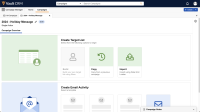
|
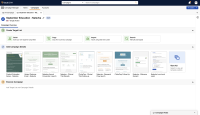
|
CLM
|
Platform |
Description |
Before |
After |
|---|---|---|---|
| CRM Desktop (Windows) | When filtering the media library on a date or datetime field, end users can now filter by date range. | n/a | n/a |
|
CRM Desktop (Windows), iPad |
The queryRecord JavaScript method now supports attachment fields for the approved_document__v object. | n/a | n/a |
|
CRM Desktop (Windows) |
End users can zoom in and out of auto-published HTML content. |
n/a | n/a |
General
24R3.4 Feature Enablement and Availability
The following table provides an explanation of feature enablement and user impact.
|
Vault CRM Feature Availability and Enablement |
||||||
|---|---|---|---|---|---|---|
|
Feature |
User |
Configuration |
Browser |
CRM Desktop |
iPad |
iPhone |
|
Account Management |
||||||
|
No |
No* |
|
|
|
|
|
|
Account Planning |
||||||
|
No |
Yes |
|
|
|
|
|
|
No |
Yes |
|
|
|
|
|
|
Approved Email |
||||||
|
No |
Yes |
|
|
|
|
|
|
Call Objectives |
||||||
| No | No* |

|

|

|

|
|
| No | No* |

|

|

|

|
|
| No | No* |
|

|

|

|
|
|
Call Planning |
||||||
|
Associating Unassigned Presentations with Unique Activities Group Calls |
No | Yes |
|
|
|
|
|
Call Reporting |
||||||
| No | Yes |

|

|

|

|
|
|
Associating Account Tactics with Product Discussions for Unique Activity Group Calls |
No | Yes |

|
|

|
|
| No | Yes |
|
|
|
|
|
| No | Yes |
|
|
|
|
|
| No | Yes |
|
|
|
|
|
| No | No* |

|
|
|
|
|
|
Defining a Default Call Object Type Based on the Account Object Type on Browser |
No | No* |

|

|

|

|
| No | No* |

|

|

|

|
|
|
Capturing Expenses on the Call Report for iPad and CRM Desktop (Windows) |
No | No* |
|
|
|
|
|
Supporting Read-Only and Required Fields for Call Report Layouts on Browser |
No | No* |
|
|
|
|
|
Capturing Unique Information on Group Call Attendees on Browser |
No | No* |
|
|
|
|
| No | No* |
|
|
|
|
|
|
Call Sampling |
||||||
|
No |
Yes |
|
|
|
|
|
|
Campaign Manager |
||||||
|
No |
Yes |
|
|
|
|
|
|
CLM |
||||||
|
No |
Yes |
|
|

|

|
|
|
No |
Yes |

|
|

|

|
|
|
Coaching Reports |
||||||
|
No |
Yes |

|
|

|

|
|
|
Events Management |
||||||
|
No |
Yes |
|
|
|
|
|
|
No |
Yes |
|
|
|
|
|
|
No |
Yes |
|
|
|
|
|
|
No |
Yes |
|
|
|
|
|
|
Recording a Virtual Event (Removed February 12, 2025) |
No |
Yes |
|
|
|
|
|
No |
Yes |
|
|
|
|
|
|
No |
Yes |
|
|
|
|
|
|
No |
No* |
|
|
|
|
|
|
No |
No* |
|
|
|
|
|
|
General |
||||||
|
No |
Yes |

|

|

|

|
|
|
No |
Yes |

|

|

|

|
|
|
No |
Yes |
|
|
|
|
|
|
No |
Yes |
|
|
|
|
|
|
Key Medical Insights |
||||||
|
No |
No* |
|
|
|
|
|
|
No |
No* |
|
|
|
|
|
|
Medical Inquiries |
||||||
| No | No* |

|

|

|

|
|
|
Customizing Delivery Methods and Delivery Details for Medical Inquiries |
No | No* |

|

|

|

|
| No | No* |

|

|

|

|
|
| No | No* |
|
|
|
|
|
|
Capturing Remote Signatures for Medical Inquiry During Engage Meetings |
No | No* |
|
|
|
|
|
Order Management |
||||||
|
Changing the Order Object Type on iPad and CRM Desktop (Windows) |
No | No* |
|
|
|
|
|
SAP Concur Integration |
||||||
|
Attaching Expense Receipts for Call Reporting with SAP Concur |
No | Yes |
|
|
|
|
| No | Yes |
|
|
|
|
|
| No | Yes |
|
|
|
|
|
| No | Yes |
|
|
|
|
|
|
Service Center |
||||||
|
No |
Yes |
|

|

|

|
|
|
Suggestions |
||||||
|
No |
Yes |
|
|
|
|
|
|
Surveys |
||||||
|
No |
Yes |
|
|
|
|
|
|
No |
Yes |
|
|
|
|
|
|
X-Pages |
||||||
|
Integrating External Data Using Vault Session ID Authentication on iPad and iPhone |
No |
Yes |
|
|
|
|
|
Integrating External Data Using SSO Authentication on Browser |
No |
Yes |
|
|
|
|
|
No |
Yes |
|
|
|
|
|
*Parity items do not typically require configuration if you are using this functionality on another platform. In some cases, VMOCs must be enabled for the added platform.
New Objects
The table below contains all objects added in Vault CRM 24R3.4.
| Object Name | Object Label | Object Description |
|---|---|---|
| connection_backed_crosslink__sys | Connection Backed Crosslink | Indicates whether a source document is associated with a Connection backed CrossLink. |
| email_thread__v | Email Thread | Object that threads Received Email and Sent Email Object records into threaded conversations. |
| received_email__v | Received Email | Object that stores received, or inbound emails. |
New Fields
The table below contains all fields added in Vault CRM 24R3.4. The fields are organized by object.
| Object | Field Name | Field Label | Description | Type |
|---|---|---|---|---|
| call_followup_task__v | account__v | Account | References the corresponding Account. | Object |
| call_followup_task__v | call__v | Call | References the corresponding Call. | Object |
| call_followup_task__v | detail_group__v | Detail Group | The task's detail group. | Object |
| call_followup_task__v | mobile_id__v | Mobile ID | Mobile ID of the record. | Text |
| call_followup_task__v | product__v | Product | References the corresponding Product Catalog. | Object |
| call_followup_template__v | account__v | Account | References the corresponding Account. | Object |
| call_followup_template__v | assigned_to__v | Assigned To | References the corresponding Account. | Object |
| call_followup_template__v | description__v | Description | Field for user description of the call followup task. | Text |
| call_followup_template__v | detail_group__v | Detail Group | The template's detail group. | Object |
| call_followup_template__v | due_date__v | Due Date | Field for user to assign a due date for the call followup task. | Date |
| call_followup_template__v | product__v | Product | References the corresponding Product Catalog. | Object |
| call2__v | call_channel_formula__v | Call Channel Formula | A formula that automatically populates a call's channel. | Text |
| case__v | patient__v | Patient | Patient record associated with the case. | Object |
| channel_assignment__v | case_queue__v | Queue | Creates the association between the queue and channel for routing. | Object |
| channel_assignment__v | external_id__v | External Id | Unique identifier assigned by the third party platform to the channel. | Text |
| channel_assignment__v | mailbox_name__v | Mailbox | Configures the mailbox to be monitored and integrated in Service Center. | Object |
| channel_assignment__v | status_message__v | Status Message | Indicates the reason associated with the status of the channel. | Text |
| data_grid_loader_configuration__v | access_type__v | Access Type | Defines where this configuration template will be available. | Picklist |
| data_grid_loader_configuration__v | create_as_object_type__v | Create as Object Type | Enables the template to create records of a specified object type. | Text |
| data_grid_loader_configuration__v | description__v | Description | Stores the description of this configuration template that displays when using the Data Grid Loader. | Text |
| data_grid_loader_configuration__v | external_id__v | External ID | Used for data loading configuration templates. | Text |
| em_event_task__v | assigned__v | Assigned | Designates the task as being assigned. | Yes/No |
| em_event_task__v | assigned_to__v | Assigned To | The user the task is assigned to. | Object |
| em_event_task__v | complete__v | Complete | Designates the task as complete. | Yes/No |
| em_event_task__v | completion_date__v | Completion Date | The completion date of the task. | DateTime |
| em_event_task__v | description__v | Description | The task's description. | Text |
| em_event_task__v | due_date__v | Due Date | The task's due date | Date |
| em_event_task__v | event__v | Event | Associates the Task with an Event | Object |
| em_event_task__v | first_assigned_date__v | First Assigned Date | The date and time when the task was first assigned. | DateTime |
| em_event_task__v | last_assigned_date__v | Last Assigned Date | The date and time when the task was most recently assigned. | DateTime |
| em_event_task__v | mobile_id__v | Mobile ID | Field used by mobile products for synchronization. | Text |
| em_event_task__v | name__v | Name | The task name. | Text |
| em_event_task__v | priority__sys | Priority | The task's priority. | Number |
| email_address__v | country__v | Country | Country where the email address is used. | Object |
| email_address__v | uq_email_country_display_domain__v | Unique aggregate field | Text | |
| user_to_channel__v | channel__v | Channel | Shared Inbox mapped to the Console Application user account. | Object |
| user_to_channel__v | user__v | User | Console Application User account mapped to shared inbox. | Object |
| xpages_sso_configuration__v | api_name__v | API Name | The API name to use when using this configuration from an X-Page. | Text |
| xpages_sso_configuration__v | authorization_endpoint__v | Authorization endpoint | The URL to redirect the user to when they need to log in to the SSO provider. | Text |
| xpages_sso_configuration__v | authorization_redirect_uri__v | Authorization Redirect URI | The URL that the user will be redirected to with an authorization code after logging into the SSO provider. This must be added to the SSO configuration. | Text |
| xpages_sso_configuration__v | client_id__v | Client ID | Client ID and Client Secret are used to identify this application to the SSO provider. | Text |
| xpages_sso_configuration__v | client_secret__v | Client secret | Client ID and Client Secret are used to identify this application to the SSO provider. | Text |
| xpages_sso_configuration__v | token_endpoint__v | Token endpoint | The URL to use to confirm with the SSO provider that the newly acquired token is valid. | Text |
Removed Fields
The table below contains all fields removed from Vault CRM 24R3.4. The fields are organized by object.
|
Object |
Field Name |
|---|---|
|
approved_document__v |
email_fragment_html__v |
| approved_document__v |
email_html_1__v |
| approved_document__v |
email_html_2__v |
| approved_document__v |
email_template_fragment_html__v |
|
consent_type__v |
disclaimer_text__v |
|
consent_type__v |
zvod_consent_default_consent_text__v |
|
multichannel_consent__v |
disclaimer_text__v |
| multichannel_message__v | consent_confirm_html__v |
|
multichannel_consent__v |
default_consent_text__v |
| multichannel_message__v |
html_message__v |
| sent_email__v | email_content__v |
| sent_email__v |
email_content2__v |
| unsubscribe__v | unsubscribe_cancel_html__v |
| unsubscribe__v |
unsubscribe_confirm_html__v |
| unsubscribe__v |
unsubscribe_html__v |
| unsubscribe__v |
unsubscribe_modify_confirm_html__v |


